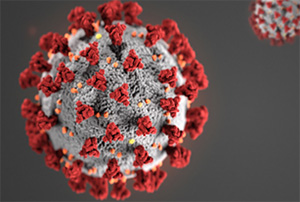 Graphic courtesy of the Centers for Disease Control and Prevention website.
Graphic courtesy of the Centers for Disease Control and Prevention website.The Office of Justice Programs (OJP) has released three blogs describing how OJJDP grantees are using innovative strategies to continue serving youth and families during the COVID-19 pandemic.
“Strengthening Connections: Mentoring Youth During a Pandemic” reports that OJJDP-supported MENTOR: The National Mentoring Partnership has developed tips and resources to help youth mentoring programs implement new approaches and continue operations during the pandemic. MENTOR is also working with iCouldBe, an e-mentoring platform, to expand and enhance virtual mentoring. iCouldBe is providing its platform free of charge to the mentoring field nationwide. A variety of corporate partners—including AT&T, Comcast, and Zoom—are donating resources to support information technology and Wi-Fi needs so as many youth as possible can stay connected in the face of social distancing requirements. In addition, some local chapters of Boys & Girls Clubs are acting as emergency childcare centers for essential workers. Big Brothers Big Sisters of America, another OJJDP grantee, is planning to launch a large-scale virtual mentoring curriculum called Mentoring 2.0.
“You Are Not Alone: Supporting Youth and Families Impacted by Substance Use During the COVID-19 Pandemic” highlights how OJJDP juvenile and family drug court grantees are adapting their practices to continue providing effective services during the public health crisis. The Rankin County, MS, court team has implemented in-home drug testing with parental supervision. On testing days, the staff text parents a reminder, and the parents text back the results. In addition, the team provided youth with a list of online mental health and addiction resources, free recovery and meditation apps, and local food resources. The Santa Clara County, CA, court team maintains contact with youth via phone and, where possible, mental health providers offer teletherapy. The Juvenile Probation Department no longer brings juveniles into custody for technical violations, and the county’s Young Women’s Freedom Center ensures clients have access to life coaches, computers, cell phones, and the Internet.
Another OJP blog released during Child Abuse Prevention Month, “Children’s Advocacy Centers: At the Forefront of the Fight Against Child Abuse,” discusses OJJDP-supported children’s advocacy centers (CACs), which coordinate the investigation, treatment, and prosecution of child abuse cases nationwide. The blog details the mission of the National Children’s Advocacy Center—a model for more than 1,000 CACs nationwide—and the CACs’ response to the pandemic. CACs dramatically increased their use of technology, with many multidisciplinary teams conducting their meetings via online platforms, and aggressively implemented teletherapy services to meet the mental health needs of children and families. National Children's Alliance, the national association and accrediting body for CACs, has developed a resource page to help children’s advocacy centers respond to the needs of children and families during the current public health crisis.
On April 1, 2020, the Department of Justice announced $850 million in OJP funding to assist states, communities, and tribes in their response to the coronavirus. The Coronavirus Emergency Supplemental Funding Program will provide funding to help eligible states, units of local government, and tribes prevent, prepare for, and respond to the coronavirus. The Bureau of Justice Assistance, one of six program offices within OJP, manages the program.
Federal COVID-19 Resources:
